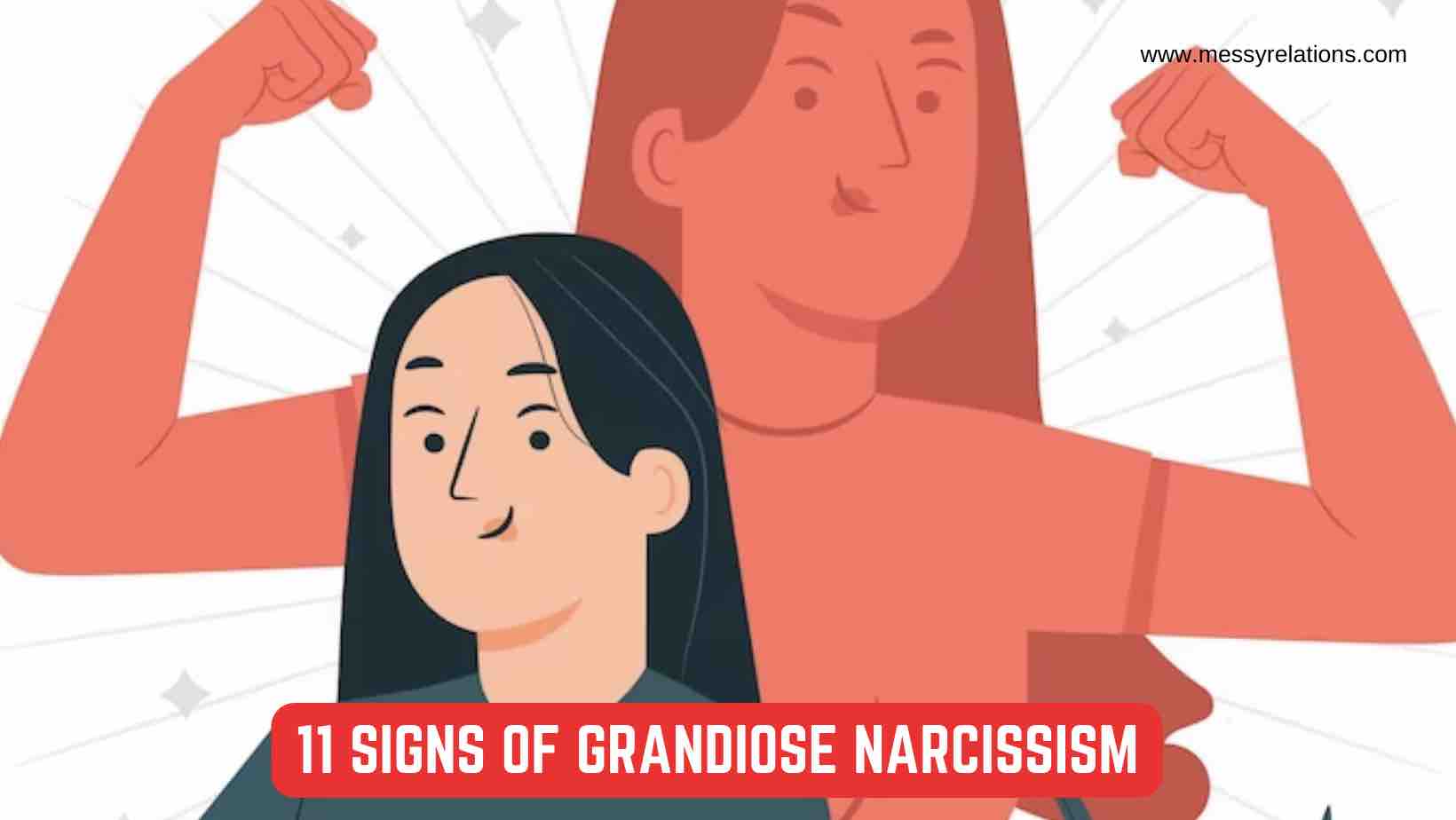Grandiose narcissism is a psychological trait characterized by an excessive sense of self-importance, a need for admiration, and a lack of empathy towards others. People with grandiose narcissism often exhibit a pattern of behavior that revolves around seeking attention, feeling superior, and disregarding the feelings and needs of those around them. Recognizing the signs of grandiose narcissism can be crucial for understanding and managing interactions with individuals who exhibit this trait. In this article, we will delve into 11 key signs of grandiose narcissism.
Signs Of Grandiose Narcissism
These signs of Grandiose Narcissism tell everything you must know and see if you are dealing with person of similar trait and we bet you’ll be able to take a much better call yourself.
1. They Have Exaggerated Sense of Self-Importance
Individuals with grandiose narcissism tend to have an inflated view of their own abilities, achievements, and importance. They may frequently talk about their accomplishments, often exaggerating their impact or significance. Individuals with this trait often exhibit an inflated perception of their abilities, expecting constant recognition and special treatment. They might exploit relationships for personal gain and struggle with empathy, viewing others as tools to fulfill their desires. Grandiose narcissists often project an air of entitlement and seek out opportunities to showcase their alleged brilliance. This behavior can lead to strained relationships, as their grandiosity blinds them to the needs and feelings of those around them, perpetuating a cycle of self-centeredness.
2. They have Constant Need for Admiration
A hallmark of grandiose narcissism is the insatiable need for admiration from others. Individuals displaying this trait incessantly seek praise, recognition, and validation from others. Their insatiable hunger for attention drives them to showcase their supposed accomplishments and talents, often exaggerating their achievements. They thrive on the attention of admirers, using charm and charisma to manipulate social interactions. This unrelenting desire for admiration can strain relationships, as they prioritize their own ego over genuine connections. This behavior serves to reinforce their inflated self-image and reinforces their perception of superiority, ultimately hindering their ability to form authentic, reciprocal relationships.
These individuals seek validation and attention, often fishing for compliments or expecting special treatment due to their perceived superiority.
3. Empathy Is No Where Inside Them
People with grandiose narcissism often struggle to empathize with the feelings and perspectives of others. Individuals with this trait struggle to understand or connect with others’ emotions and perspectives. Their self-absorption and focus on their own needs often lead them to dismiss or belittle the feelings of those around them. This deficiency in empathy enables them to exploit relationships for personal gain without remorse. Their inflated sense of self-importance overshadows others’ experiences, making it challenging to form genuine connections. This trait reinforces their grandiose self-image, perpetuating a cycle of self-centeredness that can hinder their ability to engage in meaningful, empathetic interactions.
They might dismiss others’ emotions or use them to their advantage, lacking genuine concern for anyone other than themselves.
4. They have Exploitative Behavior
Individuals with grandiose narcissism might take advantage of others to achieve their goals or feed their ego. Individuals exhibiting this trait tend to manipulate and take advantage of others for their own gain. Driven by an inflated sense of self-importance, they view people as tools to achieve their goals rather than valuing genuine connections. They are skilled at using charm and manipulation to extract resources, attention, or favors from others. This behavior disregards the well-being of those they exploit, reflecting their self-centered worldview.
They may use manipulation, coercion, or charm to get what they want without considering the well-being of those they exploit. Exploitative tendencies reinforce their belief in their exceptional status, perpetuating a cycle of self-serving actions that can strain relationships and erode trust.
5. They Believe in Being Unique and Special
Grandiose narcissists frequently hold the belief that they are exceptional and one-of-a-kind. Those with this trait perceive themselves as exceptional, above ordinary individuals. Fueled by an inflated ego, they seek constant validation and admiration to reinforce their self-proclaimed superiority. This belief often leads to a sense of entitlement and an expectation of special treatment. They view themselves as entitled to privileges and recognition due to their perceived exceptional qualities. This behavior, rooted in their grandiose self-image, hampers their ability to relate to others on an equal footing, perpetuating a cycle of self-centeredness and strained interpersonal dynamics.
They may associate only with individuals they perceive as equally special and disregard those they deem as inferior.
6. They live In Fantasies of Unlimited Success
Those with grandiose narcissism often indulge in elaborate fantasies of unlimited success, power, and brilliance. These fantasies can fuel their sense of grandiosity and entitlement.
7. They Have Intense Envy of Others
Paradoxically, grandiose narcissists can experience intense envy of others, particularly those they perceive as a threat to their self-image. This envy may drive competitive behaviors or attempts to undermine others’ achievements.
8. They are Arrogant and have Patronizing Attitude
Individuals with grandiose narcissism might come across as arrogant, condescending, or patronizing. They may belittle or demean others to maintain their sense of superiority.
9. They Cannot Handle Criticism
Grandiose narcissists have a fragile self-esteem beneath their outward confidence. They often react strongly to criticism, becoming defensive, angry, or even hostile when their flaws or mistakes are pointed out.
10. They Build Superficial Relationships Mostly
Their self-centered nature often results in superficial relationships, where they value others based on what they can gain rather than genuine connection. These relationships can be short-lived and devoid of emotional depth.
11. They Can’t Get Over Their Sense of Entitlement
Grandiose narcissists believe they are entitled to special treatment, recognition, and success without necessarily putting in the required effort. This entitlement can lead to frustration when reality doesn’t meet their expectations.
Recognizing these signs of grandiose narcissism is crucial for personal and interpersonal growth. Understanding these traits can help individuals navigate interactions with those who display these behaviors and make informed decisions about how to engage with them. It’s important to note that grandiose narcissism exists on a spectrum, and not everyone who exhibits some of these signs is necessarily a full-fledged grandiose narcissist.
How To Deal With Grandiose Narcissism?
Managing interactions with individuals exhibiting grandiose narcissism can be challenging, but there are strategies that can help:
- Set Boundaries: Establish clear boundaries and communicate your limits. Grandiose narcissists may try to push those boundaries, so it’s essential to stand your ground.
- Focus on Facts: When addressing issues or conflicts, stick to the facts and avoid attacking their ego. Present evidence and objective observations to support your points.
- Practice Empathy: While it may be difficult, trying to understand their perspective can sometimes defuse tense situations. However, avoid enabling their behavior by catering solely to their needs.
- Stay Calm: Grandiose narcissists might try to provoke emotional reactions. Stay calm and composed, as reacting emotionally can feed into their desire for attention.
- Avoid Power Struggles: Engaging in power struggles can escalate conflicts. Instead, choose your battles wisely and prioritize your well-being.
- Seek Professional Help: If dealing with a grandiose narcissist becomes overwhelming, seeking guidance from a mental health professional can provide you with coping strategies and support.
Grandiose narcissism is a psychological trait characterized by an exaggerated sense of self-importance, a constant need for admiration, and a lack of empathy. Recognizing the signs of grandiose narcissism can help individuals navigate interactions with those who exhibit this trait, while also fostering personal growth and healthy relationships. By understanding the underlying dynamics of grandiose narcissism, individuals can make informed decisions about how to engage with and manage individuals displaying these behaviors.




